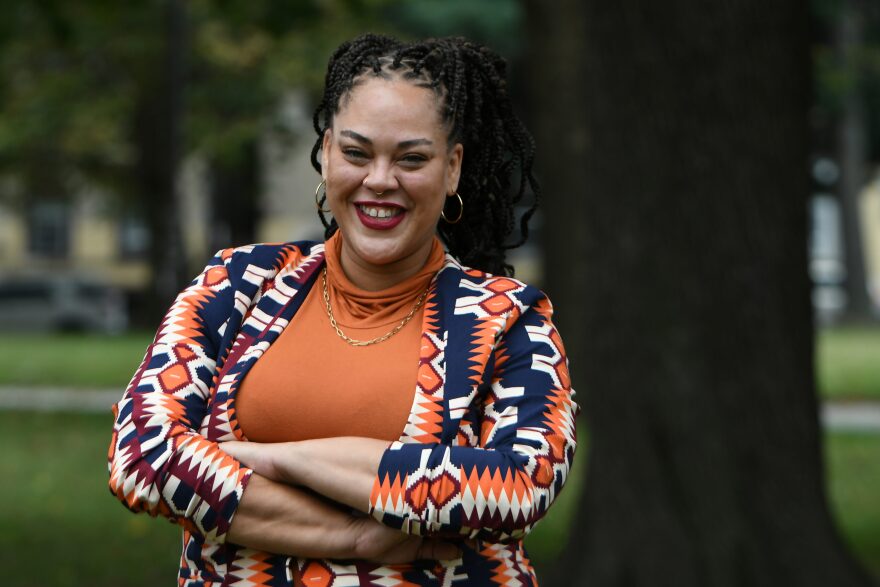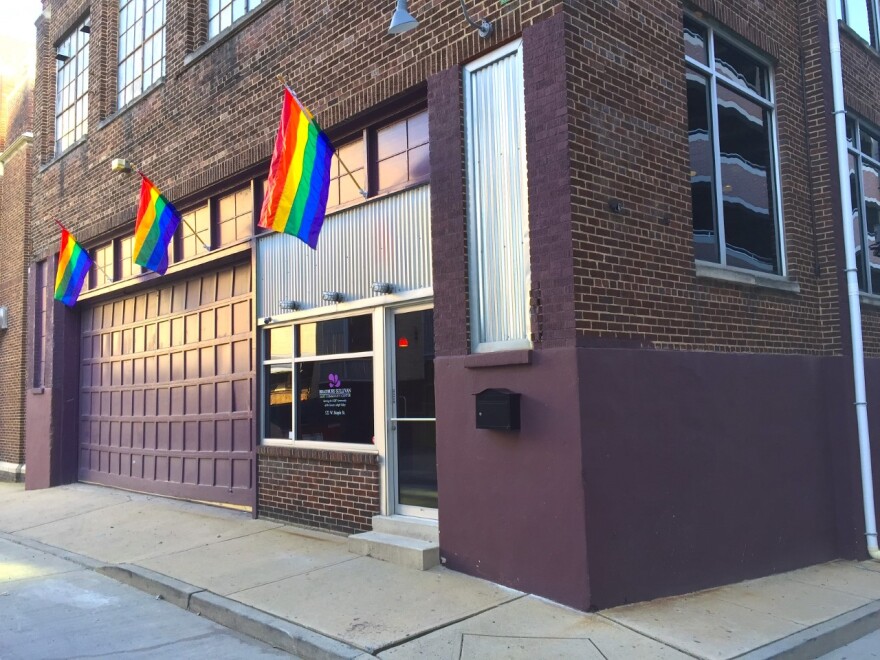ALLENTOWN, Pa. — The main LGBTQ organization in the Lehigh Valley has started to show signs of financial troubles.
Bradbury-Sullivan LGBT Community Center, which has been a central organization for the LGBTQ community in the region since opening in 2016, in recent months has laid off five employees and temporarily reduced hourly employees' time to 32 hours a week.
It also began closing on Mondays for the winter months.
That's significant because Bradbury-Sullivan Center, with an annual operating budget of more than $1 million, provides health, youth, social and arts programs for LGBTQ people in the Lehigh Valley.
The organization also puts on Lehigh Valley Pride and is one of the main collaborators in the Pennsylvania LGBTQ Health Needs Assessment.
"It's the community's organization, it's the community's money," former center Senior Development Manager Rain Black said.
"And it just feels very bad, the way that things are happening.”
Four former employees of the center spoke to LehighValleyNews.com about the financial situation and management style there.
Representatives from Bradbury-Sullivan Center leadership denied a request for an interview for this report, but responded to emailed questions with a written statement.
The center previously provided a written statement about the Monday closures, saying they were caused by contract cuts.
"We need the support of our community, accomplices, and allies during this time," the statement about the Monday closures read.
"We ask those who are in a position to do so, please consider supporting our Center through these winter months and contract cuts with a donation."
New leadership in 2023
The four past employees said financial decisions that perhaps didn't strongly enough consider the center's future have left Bradbury-Sullivan Center where it is today.
They also said the center had incidents of racism with which it didn't deal sufficiently.
Bradbury-Sullivan Center’s founding executive director Adrian Shanker left the center in March 2022. Bill McGlinn served as the interim executive director until the board appointed Ashley Coleman as the next executive director in January 2023.
Coleman previously served as executive director at GALAEI, a nonprofit organization in Philadelphia that serves the queer and trans Black, Indigenous and People of Color, or BIPOC.

All four past employees said prior to Coleman’s appointment, there were several incidents of racism that broke trust with BIPOC staff and community members.
Employees also had tried to unionize and asked the organization's board to voluntarily accept the union, the past employees said, but the board refused and notified staff it would need to follow protocols outlined by the National Labor Relations Board, according to the center's statement.
Former Health Enrollment Coordinator Ramona Flores, who worked virtually for the center from Pittsburgh, said she was disillusioned by the racist incidents at the center and by the response to the union.
Flores said she had hope for the future of the center after Coleman’s appointment, since she seemed interested in changing the company culture and rebuilding trust with BIPOC community members.
But Flores said that, from her perspective, Coleman did not follow through.
Coleman held a week-long training teaching about racism in nonprofits in general, which Flores traveled to Allentown to attend.
“It instead was a space where people were very quick to say that if a certain amount of time has passed from something, we just need to let it go. And there was never any kind of resolution.”Former Health Enrollment Coordinator for the center Ramona Flores
But staff did not discuss specific incidents or hold anyone accountable for past instances, Flores said.
“We were really holding out hope that that would be where we sort of addressed the very real situations that were happening, and not the hypothetical idea of racism and nonprofits," Flores said.
"And that's just not what happened.
“It instead was a space where people were very quick to say that if a certain amount of time has passed from something, we just need to let it go. And there was never any kind of resolution.”
Flores said she left soon after, discouraged by the lack of concrete actions.
Black, who left the center a few months ago, said he faced discrimination as a trans and neurodivergent person. He said the staff that remains at the center demonstrates the issue.
"Every person of color in the building, every neurodivergent person, and every trans person pretty much has left," Black said.
"You can see who is leaving. They just can't retain them because of the experiences that we all have."
Financial policy
When Coleman first started, the center's former Director of the Education Institute Robin Gow said he was happy with the new approach to the finances of the center.
“Initially, I was really excited by the way that she said yes to things because, generally, I was always told ‘no’ when we spent any kind of money," Gow said.
The center’s programming soon expanded.
Gow was promoted to the senior leadership level after co-founder and namesake of the center Liz Bradbury left. He created and led a new virtual training for individuals to learn more about the LGBTQ community.
The center put on new events, such as a protective hairstyle workshop in May. It also hosted for new community groups, such as one for LGBTQ people ages 55 and up.

Coleman held a town hall in Bethlehem in April, saying she was looking for ways to expand programming into the other two cities in the Lehigh Valley.
But soon, Gow said, he grew concerned.
“Consistently in meetings, I would bring up where can we pull back on spending because, just rationally, I would be like, ‘We can't keep spending money all the time constantly.’”Former Director of the Education Institute for the center Robin Gow
“What I consistently saw from leadership, from Ashley, was a lack of attention to, how are we going to get this money?” Gow said.
“Consistently in meetings, I would bring up where can we pull back on spending because, just rationally, I would be like, ‘We can't keep spending money all the time constantly.’”
Black agreed, saying it was difficult for him to raise funds in the current political climate and economy.
“In that sort of situation, normally, what you would do is pull back a bit and reassess," Black said. "And it was just this constant pressure to spend, spend, spend.”
Lehigh Valley Pride
One example both Gow and Black gave was Lehigh Valley Pride, the region’s Pride festival run by Bradbury-Sullivan Center.
The festival had previously been run at the Jewish Community Center in Allentown as a fundraiser for the center, with an admission cost of $10.
But this year, the event was held at the SteelStacks in Bethlehem, and admission was free.

The written statement from leadership said they felt the fee created “barriers to entry we felt were unfair to those who need the often life-saving services and resources most.
“We are proud that we nearly doubled our attendance and have high hopes to improve on that in the coming years,” the statement read.
According to Black, the budget for Lehigh Valley Pride 2023 was $190,000, and he raised about $100,000 in sponsorships.
The budget for the 2022 event was about $30,000, he said.
In its statement, senior leadership corroborated that Black raised $99,000 in sponsorships, but said the center spent an additional $57,000, not $91,000.
“Throughout the year we run many events. Some are designed to raise money in order to enable us to provide events like Pride for free to the community,” the statement read.
Black said he was told the budget was $190,000 in meetings with senior leadership, but does not have access to the center’s financial records.
Lack of other funding sources
Even so, there was a deficit left by Pride, Black said, and the center was not able to raise funds as much this year to make up for it.
Black said he was the only full-time staffer in the development department for most of the year. In past years, the department had about three full-time staffers and a number of interns.
Because of the lack of staff, the center was not able to renew some smaller grants, he said.
The center's former major events manager, Eric Yoak, was fired from his position in February after making "unprofessional comments." The example he gave was saying that he might have not understood something because he went to public school.
“Basically, they're just not doing the same concentration on fundraising that they had in the past."Former Major Events Manager for the center Eric Yoak
Yoak said since then, he noticed the organization has stopped doing small fundraising events such as Werk It Wednesdays.
The only new fundraising event he saw, Ghouls & Glitter Pride Night at Dorney Park, already was in the works before he left, he said.
“Basically, they're just not doing the same concentration on fundraising that they had in the past,” he said.
Yoak also said the center originally planned to hold Lehigh Valley Pride in Downtown Allentown for free, and he did not understand why the center chose to spend more money to host it at SteelStacks.
“That event is how my salary was paid," Yoak said. "I was paid because of Lehigh Valley Pride, the money that was brought in. So I honestly don't even know how they're paying that salary right now."
According to the statement, senior leadership chose to hold the event at SteelStacks because “it was a less expensive venue that would place the least stress on our entire staff who otherwise would have to build out the entire event as a street festival.”
“We spent about $49,000 on that venue and felt that was far less expensive than creating the venue from scratch as a street festival,” the statement read.
"Pride was lovely, but it shouldn't come at the expense of meeting community needs."Former Senior Development Manager at Bradbury-Sullivan Center Rain Black
Still, Gow said he does not understand why the organization chose to spend so much money on the event that the budget ended in a deficit.
“The problem is that Bradbury-Sullivan as an organization was structured so that we needed that income from Pride,” Gow said.
“And we would have made income on Pride if we wouldn't have spent so extravagantly."
Black said, “It just feels very bad. Because that money [for Pride] could have retained jobs and could have met community needs.
"Pride was lovely, but it shouldn't come at the expense of meeting community needs."
Current financial status
Gow said that on Oct. 31, he was informed Bradbury-Sullivan Center had run out of money and needed to take out a $250,000 loan, even after getting a $500,000 gift from a community member who had passed away.
“This confused me… because that amount of money for an organization should have offset any of our problem costs,” Gow said.
Gow also said he did not understand why, as a member of senior leadership, he was not informed earlier about the financial situation of the center.
He left his position about a month later.
The statement from leadership denied that the center had taken out a $250,000 loan and said it received the $500,000 gift “a few weeks ago.”
The financial problems facing the organization eventually had an impact on its staffing, resulting in five employees being laid off.
“Two of the four worked in a specific youth program which sadly was without any funding and we also had significant government contract cuts which negatively impacted the other two positions,” the statement from the center read.

The center also laid off Youth and Family Programs Manager Kim Ketterer, but brought them back as the front desk receptionist, according to the staff page of the center’s website.
Gow said because of the layoffs, there no longer are any staff members dedicated solely to working with youth, and only a few youth have attended the drop-in hours at the center over the past few months.
The statement said that there are three staff members currently working with youth — two in health programs, and one in community programs.
Those staffers also work with adults.
"With this strategic decision and your help, we can increase financial stability for the Center and our ability to provide innovative programs, services, and experiences for our LGBTQ+ siblings."A statement from Bradbury-Sullivan Center about the Monday closures
The center also began closing on Mondays for the winter months and reduced hourly employees' time to 32 hours a week.
"This decision comes from community feedback, decreases in funding, and anticipation of decreased programmatic attendance, which our Center experiences every winter," a statement about the closures read.
"With this strategic decision and your help, we can increase financial stability for the Center and our ability to provide innovative programs, services, and experiences for our LGBTQ+ siblings."
Senior leadership at the center said hourly employees will be able to work 40 hours a week again starting Jan. 1, but the center will remain closed on Mondays through February.
Flores said from an outside perspective, she thinks the layoffs and financial problems are the “logical conclusion” of adding new programming, new staff and changing Lehigh Valley Pride without enough of a focus on fundraising.
“I think that they spread themselves too thin too quickly,” Flores said.
“And this is not in a negative way, but I think that there was a big push to change things quickly and without enough long-term thought.”
Bradbury-Sullivan Center is hiring a senior manager of the LGBTQ+ Education Institute and associate communications & marketing coordinator.
The statement from leadership said the center also plans to hire another development director.
Gow posted an essay about his experience at Bradbury-Sullivan Center and why he thinks the nonprofit structure does not always benefit the community. He now is starting a mutual aid network for LGBTQ people in the Lehigh Valley.
Correction: This post was updated from its original version to reflect that the board did not vote on staff unionization efforts.


